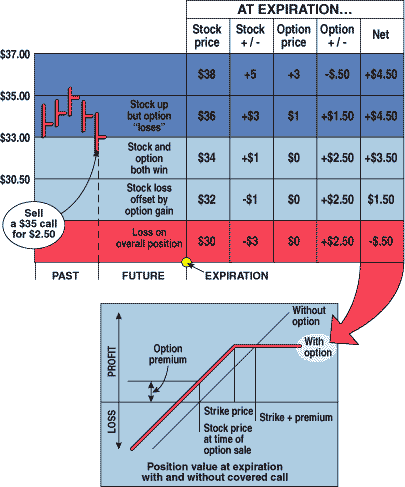OPTIONS
Increasing Return With Covered Calls
by Joe Demkovich and Eugene Theriot
Worried about how exposed you are to price fluctuation in your options position? Don't be. Here's how you can retain flexibility by using covered-call options.

FIGURE 1: WHAT CAN HAPPEN? Once you sell a call on stock you own, you're generally better off than you were before. Here are the benefits from the sale of a $35 call flow through the analysis in the table to a summary chart showing that your overall position is better than not selling calls unless the stock's price rises dramatically.
There are three principal reasons to sell calls on stocks you already own:
1 You think the stock may not go up much in the near term and you want to increase your income.
2 You want to sell the stock at a price above the current value.
3 You want some downside protection against a drop in the stock price.
In return, you must be willing to give up some of the potential upside movement in the stock.
THE OPTION BASICS
You sell a call option and give someone else the right to buy the stock from you at a fixed price (referred to as the strike price) on or before a fixed date (referred to as the expiration date). Of course, you will probably want to set the option strike price so that they will buy the stock at a price above today's price. If, at expiration, the stock price is above the strike price, your stock will most certainly be called; after all, the other party can buy it from you at the strike price and immediately sell it at a higher price. However, that doesn't have to happen. Instead, you could elect to buy back the call.
Let's assume that the stock price was $33 a month ago when you sold a $35 call (Figure 1). Now it is expiration day and the stock has risen to $37. If you do nothing, the call buyer will take you up on your offer to sell the stock, and you will have to sell your stock for $35. However, prior to expiration, you could buy back your option for about $2 (the amount that the option is in-the-money, since little time value exists at expiration). The value of your investment doesn't change, whether you buy the option back or let the stock be called away. If it is called away, you have $35, or you can pay $2 to keep a $37 stock.
So you can sell covered calls and not have your stock taken away, even if the stock price rises. But if the stock rises to a price higher than the strike price plus what you received for the call you sold, it will cost more to buy the call back than you received for the call, so you will be out of pocket some cash and you would have been better off if you had not sold the call in the first place.
The lesson here? If you really want to keep the stock, you shouldn't sell a covered call because any call with value has a chance of being in-the-money at expiration.
Joe Demkovich and Gene Theriot are partners in an options investing business. Demkovich, a retired IBM manager, teaches investing courses, and Theriot is a retired computer engineer. They can be reached via E-mail at joeandgene@att.net or at http: //JoeAndGene.home.att.net. Option analysis tools are available for download from their Website.
Excerpted from an article originally published in the January 2000 issue of Technical Analysis of STOCKS & COMMODITIES magazine. All rights reserved. © Copyright 1999, Technical Analysis, Inc.
Return to January 2000 Contents